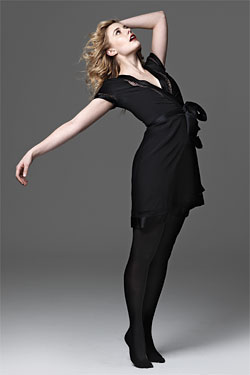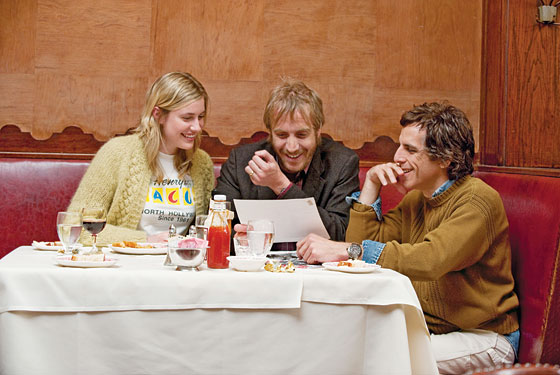
In order to prepare for her role as Florence, a personal assistant in the new Noah Baumbach film, Greenberg, Greta Gerwig spent a month working as personal assistant to Jennifer Jason Leigh’s mother. (Leigh is married to Baumbach and co-wrote the film.) She is the screenwriter Barbara Turner; she lives in the Hollywood Hills, and she likes her cappuccinos with extra foam. “You have to go to a specific Starbucks to get it,” Gerwig says. “And if the foam descends before you get it home, you have to go back and get a new one.” Which, Baumbach says, Gerwig did have to do at least once. She also took Turner’s dog to the vet and her old clothes to a consignment shop.
It’s exactly the kind of job someone like Gerwig—26 years old, studied playwriting at Barnard—would have if she had not managed to become, in the four years since graduating, the queen of the film genre known as mumblecore. Shot for very little money using digital video cameras, mumblecore films are largely improvised; and if they are European in their slow-moving spirit, they are distinctly American in their content, concerned largely with the lives of upper-middle-class postcollegiate people. Wearing a series of hacked-up haircuts, bad dye jobs, and slightly ironic thrift-store clothing, Gerwig has gotten into rambling fights with her long-distance boyfriend in the rain (Nights and Weekends); broken hearts while wearing two different pairs of silly goggles (Hannah Takes the Stairs); and generally become the sweetheart of a certain early-adult angst. Her elastic face is often wrestling with the question of how to get over the postpartum trauma that occurs when there are no more liberal-arts workshops to attend, no more professors curious about your work. She is tall and gangly with a big toothy smile, and even though she lives in Chelsea, her style is pretty Brooklyn. She once had a job working as a performance artist at The Box, where she met Laurence Fishburne, then turned to her friend and shouted, “This is our twenties!” She looks like someone who could knit a scarf.
But Greenberg is a very different movie than Gerwig has ever made. She is, for the first time, off digital video and onto rich, celluloid film. She had to audition in front of Scott Rudin, her co-star is Ben Stiller, and she had a souped-up trailer all to herself. “I definitely pushed every button in there,” she says. “I was like, It has a radio! And it works!” But perhaps the biggest difference is that the rambling conversations of her earlier films, which happen in the sad Formica kitchens of Carroll Gardens rentals, have been replaced by snappily written Baumbach dialogue and shot in carefully art-directed and wallpapered rooms in L.A. “It was a dream,” Gerwig says, “because my mom said that people were starting to think that I’m really inarticulate. And I was like, ‘Mom! Who speaks in full sentences anyway?’ Well, Barack Obama, maybe. You can hear that man’s commas. But I’m not giving speeches.”
The inarticulateness didn’t bother Baumbach. After seeing Gerwig in Hannah Takes the Stairs, he recommended that his agent check her out, which he did—and signed her before she and Baumbach ever met. Later, when Greenberg was being cast, that same agent recommended Gerwig to Baumbach. She nailed the audition and got the part on the spot.
Baumbach has a knack for difficult and complicated characters, but Stiller’s Greenberg is a doozy. He’s solipsistic, misanthropic, and sometimes cruel. He’s come to house-sit at his more-successful brother’s dreamy West Los Angeles house after a stay in a mental hospital, and he will, he’s promised, build a doghouse while he’s there. A former member of an almost-signed rock band, he now works as a carpenter in Brooklyn and has brought his tools with him on the plane. Gerwig, meanwhile, plays Florence, personal assistant to the brother, tasked with buying the organic strawberries, packing the expensive suitcases, and walking the beautiful dog. She’s a girl whose clothes don’t fit very well (“We did the fitting,” Gerwig explains, “and then I gained seven pounds; I thought her thighs needed to rub together”) and whose bookshelf in her crappy studio apartment is riddled with little yellow USED stickers from the campus bookshop. Early in the film, she tells a stranger at a crowded gallery opening, “I’ve been out of college as long as I was in, and no one cares whether or not I wake up in the morning,” which is something Gerwig herself said to Baumbach when they first met.
It’s painful to watch these two anti- heroes collide, and it’s difficult not to cheer when Florence’s best friend says, “If you give him a ride, I’m never speaking to you again.” The idea is that Florence is kind, that she’s able to see through Greenberg’s caustic shell, but the result is often cringe making: the acid man treating a lonely and pliable younger woman not well. “People are like, ‘Florence is such a pushover,’ ” Gerwig says. “And I’m like, ‘No, she’s not. She believes in him.’ ” Baumbach, too, defends Greenberg. “For me, his behavior is so clearly borne out of insecurity,” he says. “Even when he takes it out on her, it’s so clearly about him. He’s his own worst enemy, and he’s lucky to have someone like Florence who has patience.”

Gerwig’s career is about to change in any number of ways. She went to the Berlin International Film Festival and walked the red carpet in a long red Dior dress. She had her photograph taken for Vogue. She’s in talks to do a “cool indie movie about a rock band that breaks up.” And then? Who knows. There hasn’t yet been a hugely apparent difference between Gerwig and any of the characters she’s played onscreen. Though in the case of Florence, this blurring of lines was difficult: “I thought I was doing a really good job of separating Greta from Florence, and I don’t think that was true at all. When I came home, I didn’t know who I was or what I was and I didn’t have one inch of backbone left. I just felt like a marshmallow.”
Gerwig’s never been a robot or a druid or a single mother with a regional accent. Her career thus far seems to consist of characters you can’t imagine having careers or frames of reference different from her own. But she’s in love with the idea of making movies. Big ones, like Singin’ in the Rain. “I was the youngest child, and it was always just me and my parents, and I loved the idea of a big family, and there’s something about a big movie—about the community that springs up to make a movie—that I love,” she says. “And, I mean, you’re making movies! For people to go sit in the dark and feel something!” Gerwig laughs. “So,” she says. “That’s me on movies.”